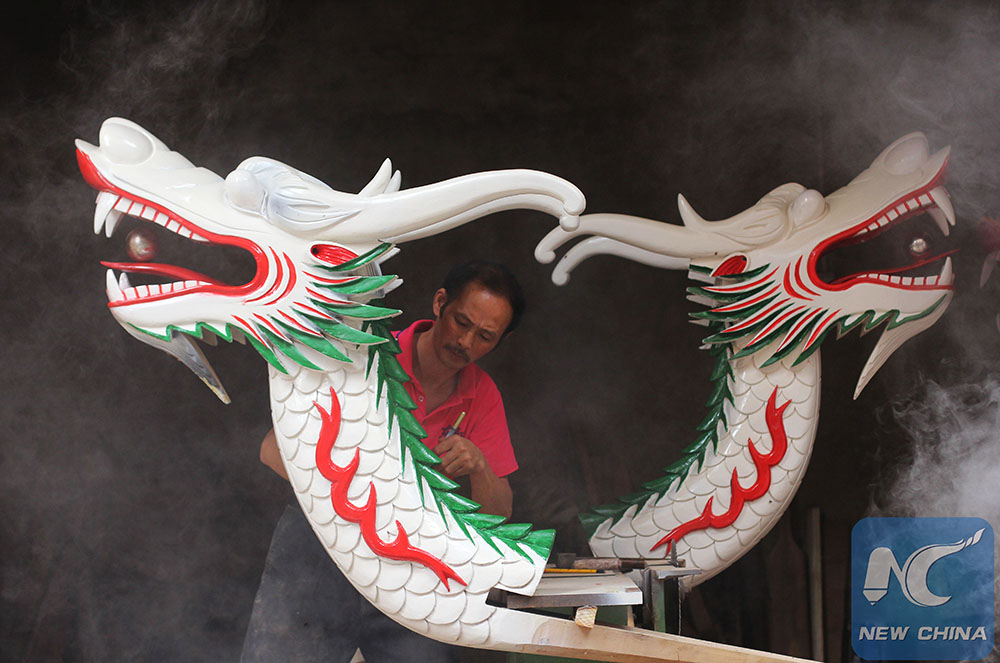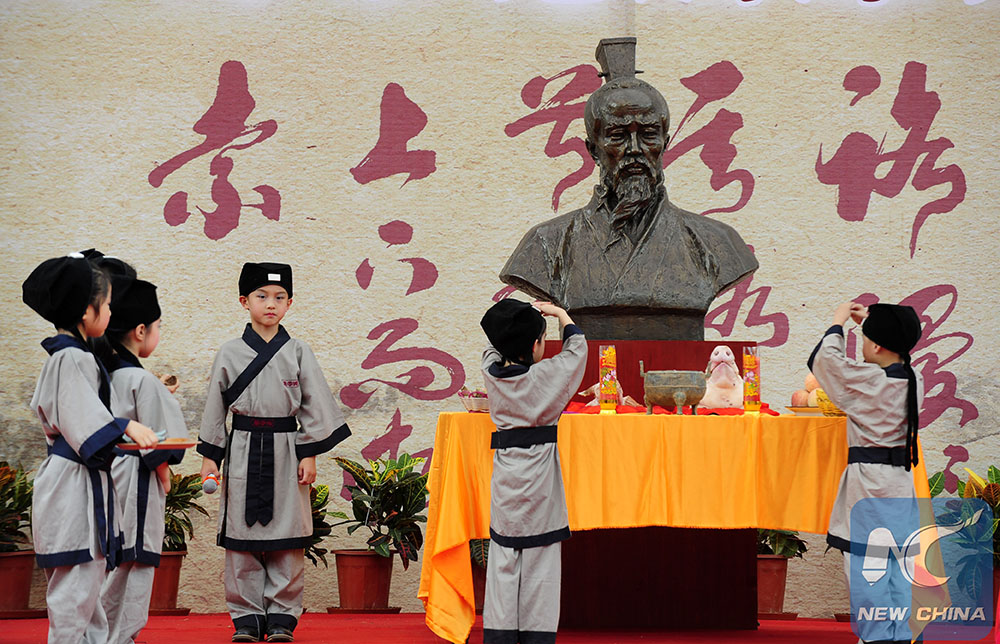Written by: Sadaf Shahzad
Posted on: June 24, 2020 | 
Dragon Boat Race Rowers (photo credits to Getty Images)
The Dragon Boat Festival or ‘Duanwu Festival’ is one of the four major traditional festivals, much like the Spring Festival, Qingming Festival, and Mid-Autumn Festival. The day touches on themes like dragons, spirits, loyalty honor, and food, which are regarded as deeply sacred to the Chinese people. And at the forefront, is the mighty and fearsome dragon, which has long been associated with China’s mythology and culture.
According to Deming An of the Chinese Academy of Social Sciences in Beijing, the dragon is the earliest mythological figure in Chinese history. It is a symbol of divine power through the control of water, rain and the rivers. In the imperial era, it was the symbol of imperial power.

A folk artist lacquers the dragon head for the boat in Yongzhou City of the Hunan Province. (photo credits to Xinhua/ He Hongfu)
The Dragon Boat Festival is celebrated on the fifth day of the fifth month of the Chinese Lunar year. It has been celebrated for over 2000 years, and has been a cultural holiday since 2006. This year, it will be celebrated on the 25th of June. Along with China, the festival is celebrated by Chinese communities in Asia and the West (to read how the Dragon Boat Festival is celebrated in other countries, click here).
The most common story associated with this day is that of Qu Yuan, a patriotic poet from the Warring Period (475-221 BC), who is still known and celebrated as the People’s Poet. Qu was a high ranking official of the royal house, till he was banished for expressing his disapproval of the king’s alliance with the enemy state of Qin. Twenty-eight years later, when the enemy captured his home state of Chu, he committed suicide by drowning in the Miluo River (which is located in the present-day Hunan Province).
There are other legendary figures who are similarly considered martyrs and are celebrated on this day for their virtue and belief in their values in the face of adversity. Wu Zixu (who died in 484 BC) was a famous premier who was forcibly drowned in the river by the King of his state. Cao E (130-144 AD) similarly drowned in the water in an attempt to save her shamanic father during an ill-fated Dragon Festival.
The traditional food of the holiday is Zongzi or ‘sticky rice dumplings’, a leafy parcel with a glutinous filling inside it. The fillings vary from sweeter fillings like dates and beans in northern China, to more savoury fillings like duck and pork in southern China. The little treat is wrapped like a parcel using leaves of bamboo, lotus or banana. It is said that when the farmers looked for Qu’s body, they threw these dumplings into the water, either to feed his soul or to prevent the fish from eating his body.
Perhaps the activity people look forward to is the Dragon Boat Race, which began as a local activity, and evolved into a popular sport. Nowadays, there is an International Dragon Federation that hosts international tournaments. It is different from Western boat sports such as rowing and canoeing, due to its unique rowing style, seating formation, and paddle shape.
There are many possible reasons as to why the boats have dragons on them. Some believe that the boats are shaped like dragons to evoke their spiritual power, others say the dragon shapes were meant to scare the fish while local farmers looked for Qu. Traditionally, farmers in the fields evoke the spirit of the dragon, which symbolizes both the masculine energy of the sun and summer solstice, and the power of rain to grow crops. The rowing of the boat is also symbolic of re-planting rice in the water, hoping for a bountiful harvest.
Other myths refer to the 5th day of the 5th month of the lunar year as an unlucky day. There are certain rituals through which people can guard against evil spirits. For example, people hang Calamus and Wormwood plants, wear 5-colored silk bracelets or pouches of perfume and traditional herbal medicines, to protect themselves and their families against evil and disease in the summer months. People paste pictures of Zhong Kui, a famously ugly man responsible for driving away evil spirits.

Children dressed in traditional clothes commemorate Qu Yuan in Wuhan of the Hubei Province (photo credits to Xinhua/ Hao Tongqian)
While different versions of these myths exist all over China, they have been modified to fit the needs of specific communities, and changes in attitudes that have taken place over a period of time. Nevertheless, the day’s cultural resonance has allowed it to endure for thousands of years as a cherished holiday, because it reminds Chinese of their traditional values and beliefs.
You may also like: